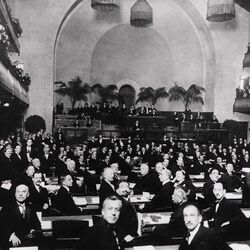I am proud of the opportunity to present to this audience of forward looking voters the leader of the Progressive forces of America, our beloved candidate, Robert La Follette.
Some of us have known him for many years, and have followed with ever increasing admiration his vigorous and brilliant career as he has continuously pushed forward the free development of our political life, has insisted that politics was but a part of ↑the↓ social process itself, and has made it keep pace with our unfolding needs and experience.
Thousands of women in Chicago bid him welcome and assure him of their convinced and unwavering adherence. They remember him as a pioneer advocate of woman suffrage, as the author of the extension of the eight hour law to governmental employees of which so large a portion are women, and of many another far reaching provision to protect women both in industry and in the home, and to make possible their fuller participation in governmental affairs.
Thousands of union labor men and women welcome him to the city and pledge him their loyal support. They know him as the outstanding advocate of constructive labor legislation both in state and nation as well as upon the high seas; as the prime mover to establish the United States Department of Labor; as the one who secured the exemption of labor from the operations of the antitrust law; one who has both built up adequate defenses and removed unjust restrictions that the workers in America may obtain for themselves the same political development which workers have achieved in other countries of Anglo Saxon Tradition.
There are many railroad men in the hall this evening and through out the country who assure Mr. La Follette of their united support. They are grateful for his long and intelligent understanding of the railroad situation and of the part railroads may play either in the [page 2] development or the retardation of our national life; he has been identified with railroad legislation from the time [he] insisted many years ago in Wisconsin that railroads be taxed upon their physical property. Closely allied to this was his regulation of telegraph and telephone services, and a long line of legislation having to do with the control of public utility corporations on the interest of the people.
I might name a score of other groups amply represented here with adequate reasons for their enthusiastic adherence, but it is above all as plain citizens of a great nation which has so sadly needed devoted statesmen who could see [its] growing needs and defend the common man from encroachment, that we are most continuously and deeply indebted to him. His unremitting attempts to clear the ground of political bosses through the direct primary and the popular election of U.S. senators is but the negative evidence of his abiding confidence in the intelligence and goodwill of the people, in their integrity of purpose, and in their zeal for righteousness if only they are kept informed and properly supplied with educational facilities. To this end his speeches and publications throughout the years bear witness, and this splendid campaign is a vindication of his faith.
There are many people in this audience of European birth and ancestry and many others of us who are enormously interested in the foreign policy enunciated by our candidate. We know through Senator La Follette's long public record that he has always treated the aggressive policies of imperialism as a moral issue, and it is in [this] spirit that his platform states the duty of the U.S. towards weaker nations, whose rights have been so unscrupulously invaded and who are so imperfectly safeguarded even by the mandate system of the League of Nations. We know that Robert La Follette as private citizen, a governor of Wisconsin, as United States senator, has [page 3] always been ready to bear this cost and to take the first steps. It is only such a man who will be able to reassure those nations south of us who have become afraid of the imperialistic policies and business aggressions of the strong neighbor.
Senator La Follette's belief in the ultimate dependence of humanity upon [its] own good will prompts him to stimulate that good will by example as well as precept. He has already declared an active foreign policy which is a direct summons to those other nations of the world with whom our own peace and social welfare are so closely bound, by advocating the abolition of conscription, the reduction of armaments, a public referendum on peace and war, as well as the promotion of treaty agreements to secure the outlawry of war itself.
It is for his courage in such matters, for his unblemished record of public service, for his rousing patriotism, and for his devotion to the interests of the common people that we gladly welcome him to this group of his enthusiastic followers, and pledge him our cooperation.
















Comments